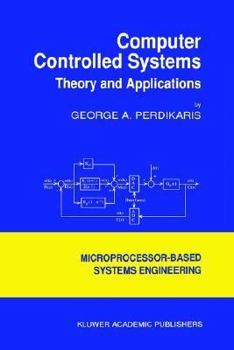Computer Controlled Systems: Theory and Applications
Select Format
Select Condition 
Book Overview
The primary objective of the book is to provide advanced undergraduate or frrst-year graduate engineering students with a self-contained presentation of the principles fundamental to the analysis, design and implementation of computer controlled systems. The material is also suitable for self-study by practicing engineers and is intended to follow a first course in either linear systems analysis or control systerns. A secondary objective of the book is to provide engineering and/or computer science audiences with the material for a junior/senior-level course in modern systems analysis. Chapters 2, 3, 4, and 5 have been designed with this purposein rnind. The emphasis in such a course is to develop the rnathernatical tools and methods suitable for the analysis and design of real-time systems such as digital filters. Thus, engineers and/or computer scientists who know how to program computers can understand the mathematics relevant to the issue of what it is they are programrning. This is especially important for those who may work in engineering and scientific environments where, for instance, programrning difference equations for real-time applications is becorning increasingly common. A background in linear algebra should be an adequate prerequisite for the systems analysis course. Chapter 1 of the book presents a brief introduction to computer controlled systems. It describes the general issues and terminology relevant to the analysis, design, and implementation of such systems.
Format:Hardcover
Language:English
ISBN:0792314220
ISBN13:9780792314226
Release Date:September 1991
Publisher:Springer
Length:481 Pages
Weight:1.90 lbs.
Dimensions:1.1" x 6.1" x 9.2"
Customer Reviews
2 ratings
Good book for signal and control systems
Published by Thriftbooks.com User , 20 years ago
I'm currently taking one of Prof. Perdikaris' classes for real-time systems, and I've been using this book to help me understand motor control systems and other stuff in the class. George covers a lot of information in the book, starting with fundamental info about ADC/DAC, continuous systems (w/ Laplace), discrete systems (w/ Z transformations), and other general signal analysis stuff that you'll need. The book then covers filter design and signal processing methods. Then covers how to design, analyze, and optimize control systems (using various methods, including open/closed loop systems and PID/PDFF systems). I believe George has done a lot of the original ground breaking research in modern control systems, PID, and PDFF over the past few decades. I wasn't too interested in control systems before taking this class, but I'm starting to find it pretty interesting and may consider taking a control class in the future. There are a lot of topics covered in the book and a lot of heavy math/electrical stuff to learn, but I think he keeps stuff relevant and understandable. If you are into signal processing or control system work, then you may want to consider picking this up.
A great textbook for computer controlled systems.
Published by Thriftbooks.com User , 27 years ago
This is an excellent textbook for computer controlled systems. The information presented is invalueable in today's digital world. If you are teaching or learning computer controlled systems you should consider this book.






